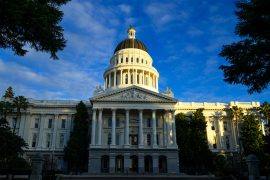Good morning!
Reuters/Chicago Tribune: Support For Obama Healthcare Law Rises After Ruling Voter support for President Barack Obama’s healthcare overhaul has increased following the U.S. Supreme Court’s ruling upholding it, although majorities still oppose it, a Reuters/Ipsos poll released on Sunday showed (Zengerle, 7/1).
The New York Times/Bloomberg News: Letter From Washington: Next Battleground Of Health Care Debate The outcome poses challenges for both presidential contenders. Mr. Obama’s claim that it means the country “can’t refight” the law is a pipe dream. Mr. Romney will be held accountable for his strong inconsistencies on health care and his refusal to offer serious alternatives. The 5-to-4 decision upholding the central tenet of Obamacare, as Republicans call it, was a better result for the Democrats. If things had gone the other way, Mr. Romney could have credibly charged that Mr. Obama wasted two years on an unconstitutional measure, instead of focusing on the economy (Hunt, 7/1).
For more headlines …
The Wall Street Journal: Health Battle Enters Round 2 A new front opened Friday in efforts to reshape how the federal government implements President Barack Obama’s health-care overhaul now that the Supreme Court has ruled to keep the law in place. Employers, insurers, hospitals, drug makers and others are angling for an advantage as the government writes the regulations and sets the policies that will bring the law to life (Radnofsky and Weaver, 7/1).
Los Angeles Times: Healthcare Law Still Faces Obstacles President Obama’s healthcare law emerged from its bruising two-year legal ordeal largely intact, with its primary goal of guaranteeing all Americans health security still standing. The Supreme Court, however, is only the first of several daunting obstacles the law must clear (Levey, 7/1).
The Washington Post: Health-Care Ruling Raises Thorny Questions About Practical, Financial Ramifications The Supreme Court’s announcement Thursday that states can opt out of the 2010 health-care law’s expansion of Medicaid without losing current federal funding has raised some thorny questions about the practical and financial ramifications. Take the debate raging over what would happen to federal spending if some states decide against participating in the expansion, which will be almost fully funded by Washington. The federal government would save money because poor people who would otherwise have been newly eligible for coverage would no longer get it (Aizenman, 6/29).
The New York Times’ The Caucus: Obama Aide Rejects ‘Tax Label’ For Health Care Law Jacob J. Lew, the White House chief of staff, on Sunday defended President Obama‘s health care law but rejected the “tax” label that the Supreme Court, in a ruling that mostly upheld the law last week, used to describe the penalty payment required for those who choose not to buy health insurance (Lowrey, 7/1).
The Wall Street Journal’s Washington Wire: McConnell, White House Debate Whether Health Law Is Tax The Obama administration and Republicans battled on the Sunday morning talk shows over whether the health-care law largely upheld by the Supreme Court last week amounts to a tax. Senate Minority Leader Mitch McConnell (R., Ky.) attacked the new law, saying it amounts to a “middle class tax increase” that’s largely going to affect Americans making less than $120,000 a year (Solomon, 7/1).
The Wall Street Journal: GOP’s New Health-Law Front Republicans are planning to use the main component of the Supreme Court decision upholding President Barack Obama’s health-care law as a weapon to try to repeal it (Radnofsky, 7/1).
The Wall Street Journal: Democrats Want To Move On After Ruling, GOP Doesn’t Democrats and Republicans have found one more thing to disagree about: In the aftermath of the Supreme Court’s landmark health-care ruling, Democrats want to change the subject. Republicans don’t (Hook and Bendavid, 7/1).
USA Today: Health Care Penalty Becomes A Sticking Point For Republicans Republican leaders said Sunday that last week’s Supreme Court decision upholding President Obama’s health care law will backfire on Obama and Democrats, in large part due to Chief Justice John Roberts’ ruling that a penalty on Americans who did not buy health insurance was legal because it was a tax (Kennedy, 7/1).
The Associated Press/Washington Post: Democrats Divided On Pitching Health Care to Voters While court Ruling Emboldens GOP Opponents Victory at the Supreme Court for President Barack Obama and Democrats on health care is reopening political divisions within the party over the unpopular law. Four months to an election with control of Congress in the balance, the court’s affirmation of the law left several Democrats insisting that the issue was settled and it’s time to focus on helping the sluggish economy (6/30).
The New York Times: For Attorneys General, Long Shot Brings Payoffs Few handicappers gave a band of Republican attorneys general much chance of success when they filed a constitutional challenge to President Obama’s health care law just minutes after it was signed on March 23, 2010. Some mocked them, while others largely ignored them (Sack and Lichtblau, 6/30).
The Washington Post: Washington’s Winners And Losers From The Supreme Court’s Health-Care Ruling The Supreme Court last week upheld the Patient Protection and Affordable Care Act, President Obama’s signature domestic achievement aimed at expanding health care coverage to 30 million uninsured Americans. The court upheld both the requirement that all individuals buy insurance, and the expansion of Medicaid, a joint federal-state insurance program for the poor — as long as the federal government does not threaten to withhold states’ Medicaid funding if states choose not to expand. Here is a look how the decision affects the local business world (Ho, 7/1).
USA Today: CBS: Roberts Switched Vote On health Care The decision by Chief Justice John Roberts to uphold President Obama’s health care law will be studied for years — and now details are emerging from the normally leak-proof Supreme Court itself. Jan Crawford of CBS News, citing “two sources with specific knowledge of the deliberations,” reports that Roberts indeed switched his vote after siding with four other conservative justices who supported striking down the law (Jackson, 7/2).
The New York Times’ Economic View: Giving Health Care A Chance To Evolve When the court affirmed the law’s constitutionality on Thursday, many forecasters were astonished. The ruling came by the slimmest of margins and was defended, in places, by deeply flawed economic reasoning. But it has paved the way for an orderly rehabilitation of America’s gravely dysfunctional health care system (Frank, 6/30).
NPR: Defeated Democrats Find ‘Vindication In Spades’ In High Court’s Health Care Ruling James L. Oberstar was riding pretty high in Congress. Over the course of 18 elections, the Democrat had never received less than 59 percent of the vote in his northeastern Minnesota district, and he had finally realized a longstanding ambition by chairing the House Transportation and Infrastructure Committee. Then, he voted for the big health care bill in 2010. Oberstar soon lost his seat, along with 63 other House Democrats. He doesn’t regret it (Greenblatt, 7/1).
The Associated Press/Washington Post: Republicans In At Least 4 States Want To Abandon Medicaid Expansion After High Court Ruling Republicans in at least four states want to abandon an expansion of Medicaid in President Barack Obama’s health care overhaul, and more than a dozen other states are considering it in the wake of the Supreme Court decision removing the threat of federal penalties (6/29).
Reuters/ Chicago Tribune: Florida Says No To Two Healthcare Law Features Florida will not implement two provisions of the U.S. healthcare law involving an expansion of Medicaid for the poor and creation of a private insurance exchange, Governor Rick Scott said on Sunday (7/1).
The Wall Street Journal: Conn. Seeks To Tighten Medicaid Eligibility Connecticut officials believe some parents of college-aid children are taking advantage of the state’s Medicaid health-insurance program for low-income adults, seeking government subsidies for their children’s health care so they don’t have to pay for private insurance (Haigh, 7/1).
Los Angeles Times: California Patients Struggle To Transition To Managed Care System One year ago, California began moving certain Medi-Cal patients into a managed healthcare system with the goal of saving money while better coordinating treatment. But for some of these low-income seniors and disabled patients, the transition has been anything but smooth, forcing severely ill patients to give up their doctors, delay treatment and travel long distances for specialty care (Gorman, 7/2).
The New York Times: Mississippi Law Aimed At Abortion Clinic Is Blocked A federal judge on Sunday night temporarily blocked the State of Mississippi from closing its last remaining abortion clinic, which was the target of a new law designed to limit abortions (Santora, 7/1).
The Associated Press/Los Angeles Times: Mississippi Abortion Law Temporarily Blocked A federal judge Sunday temporarily blocked enforcement of a Mississippi law that could shut down the only abortion clinic in the state. U.S. District Judge Daniel P. Jordan in Jackson issued a temporary restraining order the day the new law took effect and set a July 11 hearing to determine whether to block it for a longer time (7/2).
KFF Health News is a national newsroom that produces in-depth journalism about health issues and is one of the core operating programs at KFF—an independent source of health policy research, polling, and journalism. Learn more about KFF.Some elements may be removed from this article due to republishing restrictions. If you have questions about available photos or other content, please contact khnweb@kff.org.



